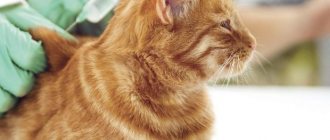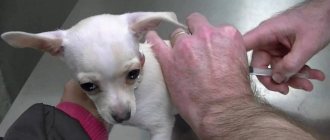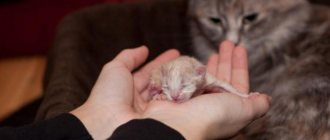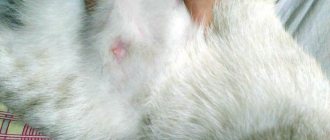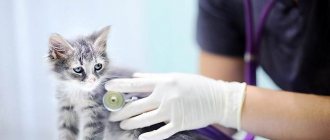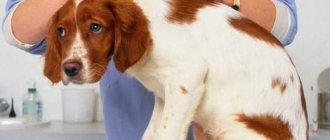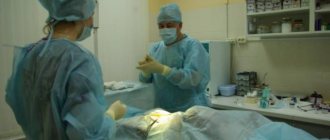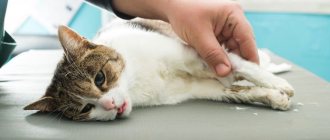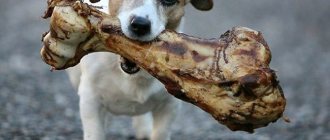The cat is lethargic after vaccination
Hello.
Please help with advice. On July 4 (at 2.5 months) I took my girl Fisa for her first vaccination, they gave her Nobivac Tricat Trio, upon arriving home, she went to her house to sleep, in the evening she didn’t even come out to eat or play, I carried her in my arms to bowl, she sniffed it and went back to bed. Usually in the morning she wakes up my husband and me at 6 am, asks to play with her, but this morning she dozed until 11 am. She got up, ate a little and went back to sleep (I tried to play with her with her favorite toys, but to no avail, she even does not respond to them), slept all day, at 10 pm I got up, ate a little and went back to sleep. I don’t even know what to do, she’s had this condition for 4 days now. I called the vet. clinic, told the situation, they replied that the side effects from the vaccine manifest themselves differently, citing the heat, which they can’t tolerate well, it’s +30 here, it’s stuffy in the apartment. Please help me with advice, I’m at a loss, I don’t know how to help the child, I see that it’s hard for her, or can the veterinarian believe that it’s all because of the heat?
Contact another vet. In my opinion, this is not normal. The vaccination is difficult, my cat is also lethargic after it, but not for more than a day (ttt). The main thing is that there are no complications.
Contact another vet. In my opinion, this is not normal. The vaccination is difficult, my cat is also lethargic after it, but not for more than a day (ttt). The main thing is that there are no complications.
I'll contact another vet tomorrow. clinic, having read the instructions for Nobivac Tricat Trio on the Internet, that all the symptoms are: drowsiness, lethargy, etc. should pass within a day, I understand. there's something wrong with my baby
Contact another vet. In my opinion, this is not normal. The vaccination is difficult, my cat is also lethargic after it, but not for more than a day (ttt). The main thing is that there are no complications.
The same thing happened. Kitten 3 months old, 2 weeks before vaccination, wormed, put first
Source
What vaccinations cause complications?
A vaccine from any manufacturer can cause complications and an allergic reaction. This does not always depend on the quality of the drug. Let's figure out what modern veterinary medicine offers vaccinations for and which of them can be dangerous.
Panleukopenia
Panleukopenia (distemper) is an infectious disease of cats that leads to death. Therefore, you need to get vaccinated. Moreover, the panleukopenia vaccine itself is considered relatively safe. If you are vaccinated against plague with a monovaccine (there are no components of other pathogens in it), then adverse reactions from such a drug are rare. Perhaps it is not recommended to give injections to pregnant cats in order to prevent neurological diseases in kittens. Also, you should not give the injection to kittens younger than 4 weeks.
Rhinotracheitis and calicivirus
Rhinotracheitis and calicivirus are often fatal diseases, so it is necessary to vaccinate your pet against them. Typically, these components are included in trivalent and quadrivalent vaccines along with panleukopenia and sometimes chlamydia. Rarely, components of the rhinotracheitis and calicivirus vaccine may cause mild fever, sneezing, conjunctivitis, lameness, and pain at the injection site. But such symptoms soon pass.
Rabies
The most common complications occur with rabies vaccination. In 4 out of 10 thousand cases, such vaccines cause sarcoma (cancer). This disease is associated with drugs containing adjuvants - auxiliary components of the vaccine. So far, there is only one rabies vaccine in the world without adjuvants: PureVax Feline Rabies Vaccine from the French company Merial. It has proven effectiveness and its use does not lead to the development of sarcomas.
Leukemia
Leukemia vaccines sometimes cause swelling and pain at the injection site, lethargy, fever, and granuloma. And although there have been no complaints about the occurrence of sarcomas associated with vaccination against leukemia, the drug contains adjuvants and therefore can be considered potentially dangerous in this regard. A new vaccine is currently being developed that does not contain adjuvants. However, leukemia is not included in the list of mandatory vaccinations.
Chlamydia
The chlamydia vaccine is not mandatory. On the contrary, it is not even recommended, because... Chlamydia in cats is not dangerous, and protection with the vaccine is ineffective. At the same time, the frequency and severity of complications after vaccination are high. Among the most common are depression, anorexia, and fever.
The problem is that the chlamydia component is included in a number of polyvalent vaccines, for example, Felocell. As a result, cats are comprehensively vaccinated against chlamydia along with panleukopenia, rhinotracheitis and calicivirus. It is the chlamydial component that in most cases is to blame for complications.
Mandatory vaccination against chlamydia is indicated only in cases where the animal is kept in high-risk conditions: for example, there are several animals in the house and one of them is a carrier of the disease.
Complications after vaccinations: chronic kidney disease
Chronic renal failure is one of the most common causes of death in domestic cats, while the disease is quite rare in wild cats. Naturally, cats live shorter lives in the wild, but it is unlikely that natural aging is the only factor influencing the development of the disease.
Why do so many cats experience kidney failure?
The answer, or at least part of the answer, may lie in the fact that for many years we have been vaccinating cats far more often than necessary.
Studies have shown a connection between the complex vaccine (FVRCP - rhinotracheitis, calicivirus, panleukopenia) and interstitial nephritis, that is, inflammation of the kidneys.
Why is this happening? Viruses that are used to make vaccines are grown in cell culture. And the cells that are used to create a complex vaccine are none other than cat kidney cells. When these kidney cells along with the vaccine are injected into a cat, his immune system recognizes them as foreign agents and produces antibodies against them. Unfortunately, these antibodies cannot tell the difference between the cells from the vaccine and the cat's own kidney cells. This leads to an autoimmune attack on the kidneys. In general, complex vaccines cause a reaction in cats similar to lupus in humans.
Caring for the animal after vaccination
It is very important to provide your tailed pet with proper care and care.
Please pay attention to several factors:. Nutrition. Feed the animal easily digestible but high-calorie food
Even if your cat refuses to eat, this is normal, but make sure she always has access to fresh water. Take a closer look to see if your pet drinks. If the cat does not touch liquid for more than two days, go to the doctor, otherwise the cat is at risk of dehydration.
Feed the animal easily digestible, but high-calorie food. Even if your cat refuses to eat, this is normal, but make sure she always has access to fresh water. Take a closer look to see if your pet drinks. If the cat does not touch liquid for more than two days, go to the doctor, otherwise the cat is at risk of dehydration.
Nutrition. Feed the animal easily digestible, but high-calorie food. Even if your cat refuses to eat, this is normal, but make sure she always has access to fresh water. Take a closer look to see if your pet drinks. If the cat does not touch liquid for more than two days, go to the doctor, otherwise the cat is at risk of dehydration.
Indoor climate. The animal’s body is weakened during this period, so try to protect your pet from drafts and too cold floors.
Communication with other animals. Immediately after vaccination, it is better to isolate the cat from contact with other pets - it may feel discomfort and a desire to hide in a dark corner.
Well, the most important “medicine” is your love and care. It's not enough to just get vaccinated. Much more important is an attentive attitude towards the animal, for which your cat will repay you with sincere devotion.
Digestive disorders in pets do not particularly surprise any experienced breeder: this can happen for any reason, but more often food intolerance or poor-quality food is to blame. If all is well, the diarrhea will go away on its own within a day or two. But in some situations the reasons are different. Can a cat have diarrhea after vaccination: how dangerous is it and should you contact a veterinarian? Let's figure it out.
To begin with, a vaccine is a rather dangerous drug of biological origin.
. It is for this reason that veterinarians advise vaccinating their pets only in the clinic. With any vaccination there is a certain chance of developing side effects.
Unfortunately, it is impossible to predict them. Moreover, sometimes responses do not develop on the same day, but a week or even a month later. It all depends on the individual characteristics of the cat’s body. This is not very normal, but still it is not something “out of the ordinary”. But if you observe the following symptoms, it is highly advisable to consult a veterinarian:
- Fever.
- Pain at the injection site.
- Swelling of the face and neck.
- Hives.
- Swollen lymph nodes.
- Vomit.
- Diarrhea.
- Pain in the hypochondrium area, manifested when trying to palpate. Indicates liver damage.
If a lethargic cat does not eat or drink, what should I do?
Often, a pet's refusal to eat can frighten the owner. When a cat is lethargic and spends most of its time in one position, this is certainly not a good sign. If the cat does not eat or drink and only sleeps, it is necessary to understand the reasons for this behavior, because it is quite possible that your cat is sick and needs to be treated.
What does it mean for a pet to refuse food and drink?
There are situations when a cat does not eat or drink for several days, but only sleeps for no reason. If a cat does not eat and therefore loses its appetite, this can be called anorexia. However, an animal's appetite is determined by psychological factors, unlike hunger, which is a physiological phenomenon.
There can be many reasons why a cat does not eat for several days and only sleeps. Often, a kitten does not eat because some harmful processes have begun in its body, that is, a disease is emerging. As a rule, if a cat is lethargic, does not even drink water for a long time and lies in one place for most of the day, then this indicates diseases of the stomach or other main organs. After all, when experiencing severe pain, the animal will not have time to eat.
Note that if the pet is very lethargic during the day and does not even drink water, this may indicate the first heat. Owners think their pet is sick, but this is not the case. In this case, the animal begins to get acquainted with new natural urges, and this can lead it to confusion. This behavior and refusal of water and food may subside within a few days and then return to normal.
If the kitten does not eat anything for a long time and does not even drink water during the day, he is lethargic and does not want to do anything, then your pet is probably sick. Often infectious diseases such as worms are the cause of lack of appetite. To prevent your pet from losing weight and being lethargic, it is necessary
Source
How does the kitten feel after vaccination?
Vaccinations help protect your animal from many cat diseases. They are especially relevant for those pets who are provided with free range in the yard. But even for those exclusively at home, vaccination should not be neglected. As you know, the owner of an animal is capable of bringing the virus on his clothes or shoes. After all, we shouldn’t forget that there are a lot of stray animals walking around the city, and they are the ones who spread diseases.
Vaccinations are a prerequisite for taking a cat abroad for mating or to an exhibition. This will protect the animal from possible infection. Without them, the cat simply will not be allowed out of the country. All information about vaccinations is included in the accompanying document.
Choosing a clinic to vaccinate kittens is a responsible undertaking. Before vaccination, the kitten must be examined by a veterinarian. Only a healthy animal can be vaccinated. It is advisable to carry out anti-helminthic and anti-flea treatment.
Kittens are vaccinated between 8 and 12 weeks of age. Subsequent revaccination is required. After this, the adult cat is vaccinated annually. If the kitten's mother is vaccinated, then vaccination begins at 12 weeks. When an animal undergoes teeth replacement, at the age of 4-7 months, vaccination is not recommended.
Often, owners are frightened by the behavior of the kitten after vaccination. The animal becomes sleepy and lethargic, and its appetite disappears. However, after 6-8 hours everything returns to normal.
But monitoring your pet during this period is extremely important. If the kitten shows anxiety after vaccination, it starts to have seizures and foams at the mouth, you should urgently take it to the veterinarian
In exceptional cases, up to 2 days are allowed, during which the animal’s behavior gradually improves. If, after this, the kitten continues to refuse food and does not play, this is a serious reason to contact the clinic.
Source
When and how to vaccinate
The rabies vaccine is administered to the baby simultaneously with a repeated complex vaccination against infectious diseases at about the age of 3-3.5 months; earlier it is not necessary. But if for some reason the kitten was vaccinated before this period, you will have to repeat the procedure again at the right time.
Unlike other vaccinations, a second rabies vaccination (after a few weeks) is not required. Each subsequent vaccine is administered only once a year or every three years (this depends on what kind of drug was administered for the first time). At the same time, delays are extremely undesirable (for example, if the first injection was given on July 1, the next one should not be later than June 30).
How to vaccinate
At the veterinary clinic, the kitten will once again undergo a control examination by a veterinarian, and if all is well, the pet will be given a drug chosen by the owner. The vaccination is done intramuscularly in the thigh, less often - subcutaneously in the scapular area.
We recommend reading: Can Ticks Be Transmitted From Cats To Humans?
A total of 1 ml of the drug is administered, which is equal to one dose sufficient to protect the pet for a whole year. If Nobivac Rabies is administered, the next vaccination will be carried out only after three years. This drug is especially good if the cat is already old, a kitten or an adult animal suffers from chronic diseases. Therefore, the less often the body of such animals experiences stress from the administration of vaccines, the better for their weakened immunity. Once every 3 years is the best option for them.
But there is also a minus: if the vaccination is done once every 3 years, unnecessary questions may arise when crossing the border, when a mandatory mark on the annual vaccination will be required (and this despite the fact that a drug that does not require administration more often than 3 years is indicated in the pet's documents). Therefore, it is more profitable to vaccinate animals with annual vaccinations.
If an adult cat is taken into your home but has not yet been vaccinated, vaccination can and should be started regardless of its age. In the future, you should adhere to the described scheme (vaccinate annually).
Manufacturers and brands of vaccinations
No vaccine manufacturer guarantees the absence of complications. There are vaccines for which complaints are received more often (Nobivac) and less frequently (PureVax). Other common brands that we do not mention in the article are recommended to a lesser extent. Let's look at the medications that veterinarians usually offer.
Nobivac
Nobivac vaccines (Nobivac, Holland) come in several varieties: Nobivac Tricat against viral rhinotracheitis, calicivirus and panleukopenia, Nobivac Rabies against rabies, etc. There are many complaints about these vaccines. There are serious consequences. Recently there was information in the English-language news that entire batches of the drug led to deaths. However, so far nothing has been proven on this score and the Nobivac vaccine is used by most veterinarians - as a rule, without consequences. In many localities, it remains one of the few ways to protect the animal.
Felocell
The Felocell vaccine (Felocell, USA) is intended for immunization of cats against viral rhinotracheitis, calicivirus infection, panleukopenia and chlamydia. The disadvantage of the quadrivalent vaccine is that it contains a component of chlamydia (it was written above that it is this that causes the main complications). It is better to stick with the trivalent vaccine.
This brand also has a rabies vaccine. As for complications after Felocell, they also occur, but not so often.
Purevax
PureVax (France) is a much less common vaccine. However, veterinarians praise the drug: complications from it rarely occur.
"Purevax" provides immunity from panleukopenia, calicivirus, rhinotracheitis and rabies
It is especially worth paying attention to rabies vaccines, which will be discussed below. In general, Purevax preparations are considered much more environmentally friendly than analogues from other companies.
Disadvantages: higher price and unavailability in many localities. At the same time, ordering the drug via the Internet is dangerous, because... there is no guarantee that it will arrive, as expected, refrigerated.
Other manufacturers
Felinologists warn that allergies and autoimmune reactions are often observed with the Biofel vaccine; the Multifel vaccine is well tolerated, but its ability to develop immunity is questionable. There are also complaints of numerous allergic reactions to the Felovax vaccine.
Routes of infection
The main and, in fact, the only thing is infection through a bite. In this case, the virus immediately enters the wound canal along with the saliva of the sick animal, and then begins to move towards the nearest nerve trunks. But there are still two more hypothetically possible ways of infection:
Through food. But! If a cat simply eats meat from a rabid animal, nothing bad will happen to it. The same applies to cases of eating “mad” milk. The problem is more complicated. The fact is that the maximum amount of the infectious agent is based in the brain. And even if the cat eats the brains of a sick animal, it most likely will not get sick, since in the acidic environment of the stomach the virus dies almost instantly. But in cases where there are wounds and scratches in the pet’s mouth and esophagus (received, among other things, while eating bones), infection is really real.
Infection by airborne droplets. But in this case, the verdict of the experts is clear – this cannot happen in “field” conditions. For infection in this case, an extremely high concentration of the virus in the air is required, which is unattainable even if the sick cat stays in the same room for the whole week.
This pathology is extremely dangerous due to the fact that once clinical symptoms develop in a person or animal, it is no longer curable. More precisely, if the cat has not been vaccinated and is suspected of having rabies, it must be euthanized (in some cases after quarantine, but not later than the appearance of the first symptoms). The bitten person is prescribed a course of monovalent autoimmune serum (the injections are extremely painful, but help save the patient’s life).
What is rabies in cats
But what is rabies in cats? After all, almost everyone has heard about this disease, and everyone also knows that it is extremely dangerous. But why and why?
It's all about the causative agent and the characteristics of the pathogenesis of rabies:
- The virus belongs to the rhabdovirus family and is a neurotropic parasite. This means that the microorganism purposefully affects nerve tissue, “focusing attention” on the brain. It is the defeat of the central nervous system that leads to inappropriate and aggressive (but not always) behavior of the sick animal.
- The virus is released in large quantities in the saliva of a sick cat, since its replication additionally occurs directly in the salivary glands of the pet. It should be noted here that the release of the virus begins even before the first clinical signs appear, and therefore in cases where an apparently healthy cat bites its owner (during play, for example), everything can end tragically.
- Rabies does not always occur in a “canonical” manner. Many believe that this disease is necessarily accompanied by severe aggression and drooling in the animal. But in fact, there are several forms of this disease. Many of them (paralytic, atypical) do not involve any aggression at all, and the owner may not even understand what exactly happened to his pet.
Complications in cats after vaccination
It is for these reasons that veterinarians recommend timely vaccination of cats - in other words, vaccinations. Today, veterinary clinics use high-quality drugs that do not cause life-threatening consequences for the cat.
Still, sometimes owners face a number of complications, and it is important to know what to do in this situation
Cat after vaccination
Complications in cats after vaccination can occur for a number of reasons. One of the main reasons for unpleasant consequences may be vaccination during a cat's illness. Be sure to have your animal examined by a veterinarian, undergo a full examination and treatment for parasites. Only healthy individuals need to be vaccinated.
The second factor is an allergy to some component of the vaccine or intolerance to a certain drug. This happens extremely rarely, but it is still worth being vigilant and closely monitoring your pet after vaccination.
On the first day after vaccination, your cat may experience non-life-threatening symptoms:
lethargy and weakness;
lack of appetite and nausea;
slight increase in temperature;
increased thirst or, conversely, refusal of water;
swelling and slight inflammation at the injection site.
This is a completely normal reaction to the vaccine, so there is no reason to worry. But if you notice that the symptoms intensify and last for several days, be sure to consult a doctor. Hidden diseases that were not detected during the examination could have become active in the animal’s body, and this already seriously affects the cat’s health.
Caring for the animal after vaccination
It is very important to provide your tailed pet with proper care and care.
Please pay attention to several factors:. Nutrition
Feed the animal easily digestible, but high-calorie food. Even if your cat refuses to eat, this is normal, but make sure she always has access to fresh water. Take a closer look to see if your pet drinks. If the cat does not touch liquid for more than two days, go to the doctor, otherwise the cat is at risk of dehydration.
Nutrition. Feed the animal easily digestible, but high-calorie food. Even if your cat refuses to eat, this is normal, but make sure she always has access to fresh water. Take a closer look to see if your pet drinks. If the cat does not touch liquid for more than two days, go to the doctor, otherwise the cat is at risk of dehydration.
Indoor climate. The animal’s body is weakened during this period, so try to protect your pet from drafts and too cold floors.
Communication with other animals. Immediately after vaccination, it is better to isolate the cat from contact with other pets - it may feel discomfort and a desire to hide in a dark corner.
Well, the most important “medicine” is your love and care. It's not enough to just get vaccinated. Much more important is an attentive attitude towards the animal, for which your cat will repay you with sincere devotion.
Is rabies vaccination dangerous for cats?
Some owners believe that rabies vaccination can be harmful to their cat's health. This is a completely wrong judgment. Modern veterinary medications, which are used for preventive immunizations and revaccinations, are absolutely safe for animals.
As a rule, post-vaccination reactions and complications develop due to the individual sensitivity of the body to vaccine components, if the rules for working with medications are not followed.
For rabies vaccination, special rabies monovalent vaccines or complex vaccinations are used, which provide protection against several infections simultaneously. After immunization, specific immunity is formed within 21-25 days, the duration of which is 12-36 months.
Advice! It is necessary to vaccinate not only cats that walk along the street, but also furry pets that do not leave the house, especially in regions unfavorable for this infection.
Vaccination should be given to cats that participate in breeding, exhibitions, and also when traveling to another country, abroad.
To minimize the risk of developing possible post-vaccination complications, have your veterinarian administer the vaccine. Specialists will select an effective, safe drug and monitor the animal’s condition after the injection.
Only clinically healthy animals are allowed to be vaccinated against rabies. Before vaccination, the veterinarian conducts a comprehensive examination of the animals and measures the temperature. Weakened, exhausted cats and animals that are at the recovery stage are not vaccinated. Pregnant cats are not allowed to undergo vaccinations, since vaccination can cause disruption of embryogenesis and spontaneous miscarriages. Kittens may be born weakened, with congenital anomalies and pathologies.
Important! The first vaccination for kittens is given at the age of three months. Complex vaccines are used. Re-vaccinate after 21-30 days with the same vaccine. In the future, animals are revaccinated once a year or every three years.
Before vaccination, deworm your cat about three weeks using complex systemic anthelmintics. Treat the fur against external parasites with insecticidal and acaricidal agents.
After vaccination, it is worth keeping the vaccinated cat in quarantine for two weeks, limiting communication with other animals. Avoid hypothermia, overheating, protect your pet from stress and other factors that weaken the body. Carefully monitor the behavior and health of your furry pet, since immediately after the injection, side symptoms may appear in the first two to three days.
Cat behavior during recovery from anesthesia
During recovery from anesthesia, the cat sleeps most of the time. After waking up, the owners may notice lethargy in the pet’s movements, an uncertain, unsteady gait caused by general weakness of the body (see what a cat’s behavior should be after sterilization).
There is no need to worry, as this is a normal course of the process of coming out of a drug-induced state. During this period, it is necessary to carefully monitor the pet, do not allow it to hide or climb too high.
It is not recommended to feed the cat on the first day after the operation, but the animal needs clean drinking water. You can switch to a traditional diet only after the pet has finally recovered from the effects of sterilization. At first, the food should be light, its quantity small. Otherwise, constipation will have to be treated. If the animal does not want to eat, you should not try to force feed it.
It is very common for cats to tremble after sterilization. In this case, there is also no need to worry, since trembling is a consequence of a violation of the body’s thermoregulation caused by surgical intervention.
Dangerous consequences
Allergy to vaccine
Sometimes vaccination provokes an allergic rash in furry cats.
If the animal is allergic, the injection is administered under the influence of an antihistamine. If there was no allergy to the first vaccination, this does not mean that it will not happen again. The substance can accumulate and cause complications in the cat after vaccination. Can be light or heavy. It manifests itself in the form of rashes, itching, swelling of the mucous membranes, and in severe cases - of the respiratory tract and internal organs. Rarely - anaphylactic shock. Requires immediate medical attention. There may also be hair loss, loose stools, vomiting, altered behavior, and the cat becomes lethargic.
The pet is limping
After vaccinations, the cat may develop lameness, a lump at the injection site, a lump, swelling, or a ball under the skin. These symptoms go away after a few days, but sometimes last a long time. May be due to inept administration of the vaccine by a veterinarian or an individual reaction. Sometimes when the drug gets into a nerve ending or vessel. If the injections are injected into a large nerve and it is damaged, sometimes the hind legs even fail.
Mild course of the disease
Removing worms on the eve of the procedure guarantees a normal immune response to the vaccine.
After vaccination, the cat may get sick. This occurs due to reduced immunity due to worms, inflammatory processes or indolent diseases. Vaccination should be carried out when the animal is in full health, and anti-worm tablets should also be given before it. If the cat had contact with sick pets, that is, when the quarantine had not yet passed, then it is not surprising that it became infected. During this period, the immune system is weakened.
Kidney failure
Scientists have identified the relationship between the complex vaccine and this disease. These drugs are produced from cat kidney cells. Action - once in the body, antibodies begin to be produced against the same kidney cells, destroying them. As a result, kidney failure occurs. The reason is frequent vaccinations. This complication occurs rarely.
Sarcoma after vaccination
During rabies prevention, the animal may develop sarcoma.
A malignant cancerous tumor may develop at the site of vaccine administration. Called sarcoma. This happens very rarely. But such a formation grows quickly, and the result is that the cat died. This happens after a rabies vaccination that contains an adjuvant substance. Its actions are associated with causing an inflammatory process at the injection site and the formation of strong immunity. It is recommended to purchase vaccines without it. If the cat gets sick, in the early stages of the sarcoma an operation is performed to remove it, an injection is given intramuscularly into the paw - amputation is done.
Post-vaccination complications in cats
After administration of the rabies vaccine, cats may develop complications and side symptoms in the first hours or days. Both local and general post-vaccination reactions on the part of the body are possible.
To reduce the risk of developing complications after immunization and revaccination, it is best to use culturally licensed domestic and foreign vaccines that are produced on cell cultures. Such drugs are safer for cats than those that contain isolated and then killed or weakened viral strains. When live vaccines are administered to sick, weakened, immunosuppressed cats, clinical development of the disease is possible
In the first two days after vaccination, the cat may be lethargic, apathetic, and respond inadequately to external stimuli. Animals can show aggression towards the owner and their relatives. Allergic reactions and disturbances in the gastrointestinal tract are possible.
As a rule, the pet’s condition should return to normal within a week after vaccination without any treatment or third-party intervention. If this does not happen, the cat is getting worse every day, immediately contact and consult with a veterinarian.
Typical post-vaccination reactions and complications in cats following the administration of rabies vaccines:
- acute allergy, skin itching;
- discomfort in the vaccine injection area;
- lethargy, drowsiness, apathy;
- loss of appetite, refusal of food, favorite treats;
- pallor, cyanosis of mucous membranes;
- impaired coordination of movements;
- salivation, lacrimation;
- enlarged lymph nodes;
- fever;
- cramps, muscle spasms. epileptic seizures;
- cough, sneezing, mucous discharge from the nose, eyes;
- slight increase in general temperature;
- spontaneous urination, defecation.
We recommend reading: Is Urinary Incontinence Treated in Old Dogs?
After the vaccine, a slight painful swelling or swelling may occur at the injection site. If a nerve is touched when a needle is inserted, lameness, muscle cramps, and spasms are possible.
An acute systemic allergic reaction in cats develops during the first hours or immediately after vaccination. Post-vaccination allergies occur in mild or severe forms. Most often it is caused by the body’s hypersensitivity to the active components of the veterinary drug.
The most severe manifestation of allergies is anaphylactic shock , which can occur with a minimal amount of allergen in the body. Accompanied by rapid shallow breathing, shortness of breath, profuse salivation, increased or decreased temperature, cardiac arrhythmia, coma, and convulsions. In this case, you need to help your pet as soon as possible. Otherwise, the anaphylactic reaction progresses, collapse occurs, and the cat may die due to severe spasm and swelling of the larynx.
Some cats, especially high-breed cats, develop autoimmune diseases after vaccination, in which the body does not form a protective reaction to the introduced antigens.
Recently, abscesses and sarcomas (soft tissue tumors) have been very often noted at the injection sites of vaccines, especially inactivated ones. Inflammation of the superficial and deep layers of the dermis in cats is possible if the rules of asepsis and antiseptics are violated, or if expired or contaminated veterinary medications are administered.
Prevention
In order for everything to go well, it is better not to carry out disease prevention while the animal is pregnant.
To minimize the risk, you must adhere to certain rules. The vaccination must be done by a specialist in the clinic, so that the cat is under the supervision of a doctor for an hour. It is necessary to check the expiration date of the vaccine. Injections should be given when the animal is healthy and not wormed. Adhere to the vaccination and revaccination dates. After vaccination, do not bathe, do not wash the injection site, and do not overcool. Be sure to comply with quarantine. During teething in kittens and pregnancy in adult cats, it is better to abstain.
The owner should monitor the pet's condition in the first week. The cat stopped eating and drinking, vomited, a wound or other symptoms listed above appeared at the injection site; this must be reported to the veterinarian. Only he will decide whether to take measures for treatment. If a cat vomits, this may be a common individual symptom, or it may indicate the onset of anaphylactic shock.
When is the rabies vaccine given?
Cats need to be vaccinated against rabies annually, starting at one year of age. A pet that does not go outside also needs a rabies vaccination, just like one that lives in the yard. This should become the rule when keeping animals, except in cases of illness. You can choose a comprehensive vaccine against rabies and other infections, or get one vaccination against infections first, and three weeks later - a vaccination against rabies. Every spring, public utilities provide free rabies vaccinations. Veterinary clinics will offer you vaccines from imported and domestic manufacturers.
To ensure that the administration of the rabies vaccine does not cause negative consequences, the following rules must be observed before vaccination:
- the cat must be healthy;
- she should not take antibiotics for two weeks before vaccination;
- before vaccination, treatment against parasites (helminths, fleas, ticks) is carried out, which should be completed 2 weeks before vaccination;
- Vaccinations are contraindicated for pregnant and lactating cats;
- Before the procedure, you should avoid stressful situations - moving, exhibitions, guests, etc.
- Elective spay and neuter surgeries should not be performed two weeks before and after surgery.
shutterstock
The consequences of cat vaccination can be minimized by following simple quarantine and care measures.
- After vaccination, the animal must be isolated from other animals, if any, in the house.
- Do not let them go outside if the family lives in a private house.
- The quarantine should last one and a half to two weeks.
- The pet is placed in a warm room, which is cleaned and disinfected daily.
Although no doctor can guarantee the absence of adverse reactions to the rabies vaccine, following the recommendations listed can reduce them to a minimum.
https://youtube.com/watch?v=VdV_O53Onnc
Allergic and anaphylactic reactions to vaccination in cats.
Allergic reactions occur when the immune system overreacts to foreign substances entering the body.
Anaphylactic reactions are very severe allergic reactions that affect the condition of the entire body. They pose a danger to life even with timely assistance.
Typically, the organ most susceptible to allergic reactions is the cat's lungs. When reactions are severe enough, clinical signs include coughing (possibly with blood), difficulty breathing, collapse, and death.
Another target of allergic attacks is the digestive tract. In cats, vomiting (severe) and diarrhea, sometimes with blood, may occur.
Other serious reactions can affect blood vessels (vasculitis), red blood cells (Immune-mediated hemolytic anemia), platelets (Immune-mediated thrombocytopenia), and any other organ in the body.
Mild allergic reactions can cause swelling of the face, swelling of the extremities, and itching.
Foreign substances that can cause allergic (anaphylactic) reactions are often found in vaccines, medications, food, and so on.
Complications after vaccinations: allergic reactions/anaphylaxis
An allergic reaction is an overreaction of the immune system to a foreign substance that has entered the body. Anaphylactic shock is the most serious form of allergic reaction and can be fatal.
Most often, manifestations of anaphylactic shock affect the lungs of the animal: the cat begins to cough, breathes with difficulty, coughs up blood, loses consciousness and, if action is not taken, dies. Anaphylactic shock develops rapidly.
Shock can also affect the cat's gastrointestinal tract, resulting in vomiting and diarrhea, sometimes mixed with blood.
Other serious allergic reactions:
- vasculitis;
- hemolytic anemia;
- thrombocytopenia.
Allergies can potentially affect any organ.
Milder symptoms of allergies include swelling of the face and limbs and itchy skin.
What is the gag reflex
In purring cats, vomiting occurs frequently - this is a manifestation of the normal functioning of the cat's gastrointestinal tract. But sometimes the gag reflex becomes a symptom of a serious illness.
Vomiting is a spontaneous action of the body. A special center located in the animal’s brain gives the command to eject the contents of the intestines. When a cat feels bad, it vomits - its body protects itself by removing poisons, toxins, excess food and foreign bodies that have entered the stomach.
But gagging is the tip of a huge iceberg. The brain center gives orders and is activated for other reasons (illness, increased intracranial pressure, gastrointestinal pathologies). Sometimes the cat vomits in the car - when the cat is shaken violently, its vestibular apparatus cannot cope and sends a danger signal to the brain. The result is vomiting.
Cat vomiting is a universal and multifaceted symptom. The owner of a furry cat needs to know everything about this reflex in order to figure out in time what is happening to the pet and respond competently.
